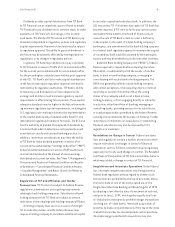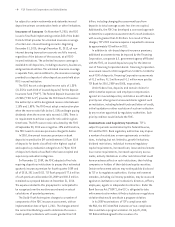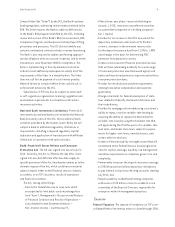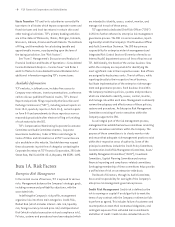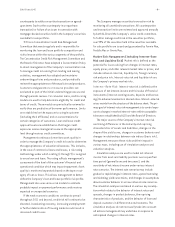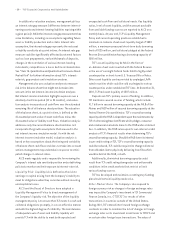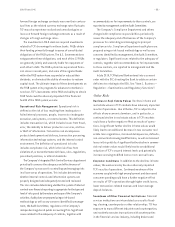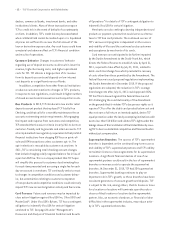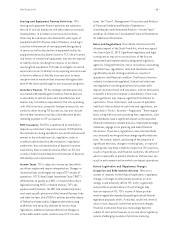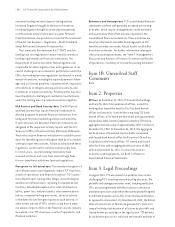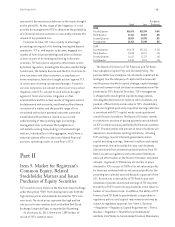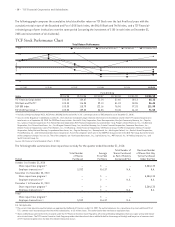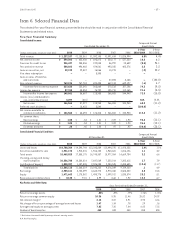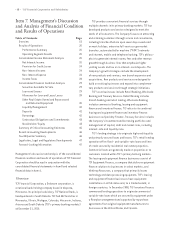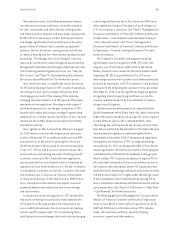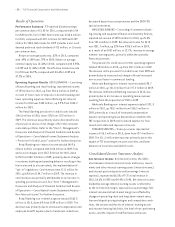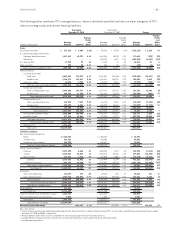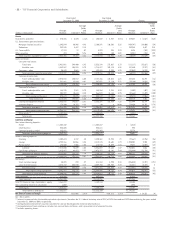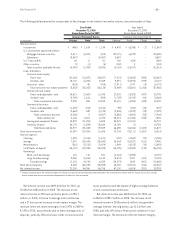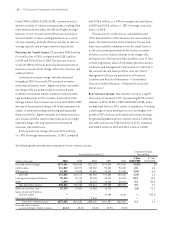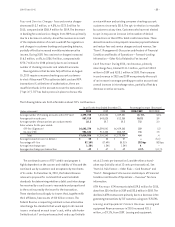TCF Bank 2010 Annual Report Download - page 31
Download and view the complete annual report
Please find page 31 of the 2010 TCF Bank annual report below. You can navigate through the pages in the report by either clicking on the pages listed below, or by using the keyword search tool below to find specific information within the annual report.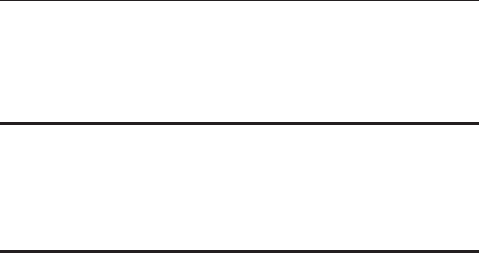
• 15 •
2010 Form 10-K
any event it has meritorious defenses to the claims brought
by the plaintiffs. At this stage of the litigation, it is not
possible for management of TCF to determine the probability
of a material adverse outcome or reasonably estimate the
amount of any potential loss.
From time to time, TCF is also a party to other legal
proceedings arising out of its lending, leasing and deposit
operations. TCF is, and expects to become, engaged in a
number of foreclosure proceedings and other collection
actions as part of its lending and leasing collections
activities. TCF may also be subject to enforcement action
by federal regulators, including the Securities and Exchange
Commission, the Federal Reserve and the OCC. From time to
time, borrowers and other customers, or employees or
former employees, have also brought actions against TCF,
in some cases claiming substantial damages. Financial
services companies are subject to the risk of class action
litigation, and TCF is subject to such actions brought
against it from time to time. Litigation is often
unpredictable and the actual results of litigation cannot
be determined with certainty, and therefore the ultimate
resolution of a matter and the possible range of loss
associated with certain potential outcomes cannot be
established with confidence. Based on our current
understanding of these pending legal proceedings,
management does not believe that judgments or
settlements arising from pending or threatened legal
matters, individually or in the aggregate, would have a
material adverse effect on the consolidated financial
position, operating results or cash flows of TCF.
Part II
Item 5. Market for Registrant’s
Common Equity, Related
Stockholder Matters and Issuer
Purchases of Equity Securities
TCF’s common stock trades on the New York Stock Exchange
under the symbol “TCB”. The following table sets forth the
high and low prices and dividends declared for TCF’s com-
mon stock. The stock prices represent the high and low
sale prices for the common stock on the New York Stock
Exchange Composite Tape, as reported by Bloomberg.
As of January 31, 2011, there were 7,299 holders of
record of TCF’s common stock.
Dividends
High Low Declared
2010
Fourth Quarter $16.63 $12.90 $.05
Third Quarter 17.66 13.87 .05
Second Quarter 18.89 14.95 .05
First Quarter 16.83 13.40 .05
2009
Fourth Quarter $14.72 $11.36 $.05
Third Quarter 15.83 12.71 .05
Second Quarter 16.67 11.37 .05
First Quarter 14.31 8.74 .25
The Board of Directors of TCF Financial and TCF Bank
have adopted a Capital Plan and Dividend Policy. The
policies define how enterprise risk related to capital will be
managed, how the adequacy of capital will be measured
and the process by which capital strategy, capital manage-
ment and common stock dividend recommendations will be
presented to TCF’s Board of Directors. TCF’s management
is charged with ensuring that capital strategy actions,
including the declaration of common stock dividends, are
prudent, efficient and provide value to TCF’s shareholders,
while ensuring that past and prospective earnings retention
is consistent with TCF’s capital needs, asset quality and
overall financial condition. The Board of Directors intends
to continue its practice of paying quarterly cash dividends
on TCF’s common stock as justified by the financial condition
of TCF. The declaration and amount of future dividends will
depend on circumstances existing at the time, including
TCF’s earnings, level of internally generated common
capital excluding earnings, financial condition and capital
requirements, the cash available to pay such dividends
(derived mainly from dividends and distributions from TCF
Bank), as well as regulatory and contractual limitations
and such other factors as the Board of Directors may deem
relevant. In general, TCF Bank may not declare or pay a
dividend to TCF in excess of 100% of its net retained profits
for that year combined with its net retained profits for the
preceding two calendar years without prior approval of the
OCC. Restrictions on the ability of TCF Bank to pay cash
dividends or possible diminished earnings of TCF may limit
the ability of TCF Financial to pay dividends in the future to
holders of its common stock. In addition, the ability of TCF
Financial and TCF Bank to pay dividends is dependent on
regulatory policies and capital requirements and may be
subject to regulatory approval. See “Item 1. Business
— Regulation — Regulatory Capital Requirements”, “Item 1.
Business — Regulation — Restrictions on Distributions”
and Note 14 of Notes to Consolidated Financial Statements.


